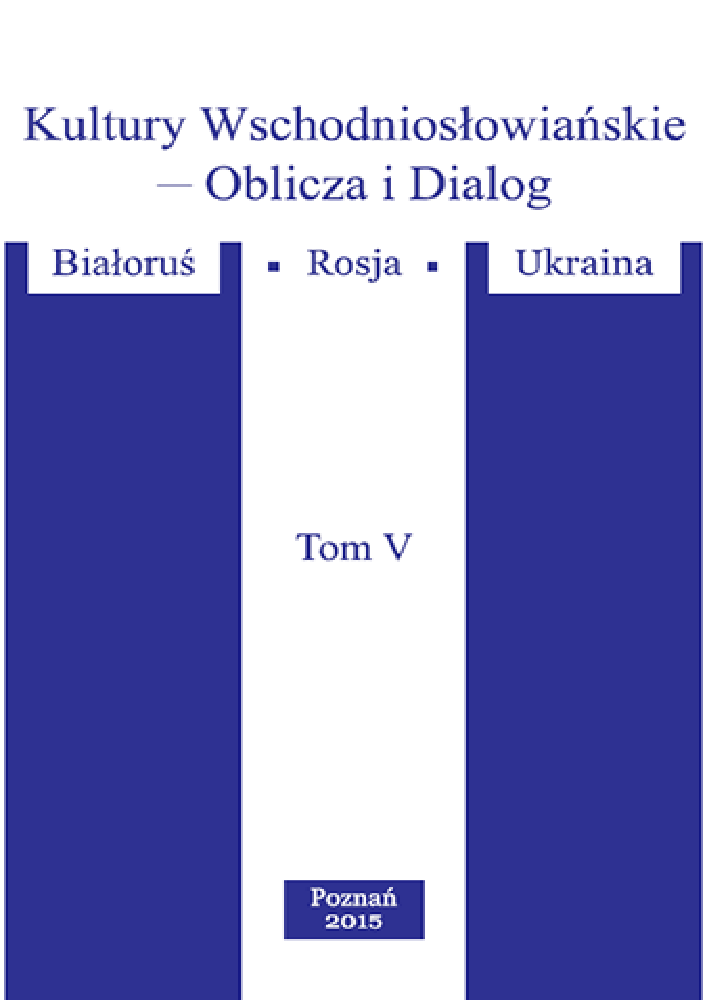Abstrakt
This paper aims at sketching cultural portrayals of the Ukrainian city Odessa and the Bosnian capital, Sarajevo, with reference to their current socio-political situation. Cultural visions of both places not only tend to have a lot in common, paradoxically due to the differences that they share but also the ones present in various texts of culture. Thus, both cities can boast their own myths. The symbolic space is approached among others through the prism of Vladimir Toporov’s theory. The city perceived by some researchers as a metaphor of culture functions as a kind of laboratory that fixates social and cultural changes emerging within the society on the microscopic scale. In addition, the current geopolitical situation of those places is mentioned with its war/conflict aftermath that contributes to certain city image.
Bibliografia
Badescu, Gruia. (POST) COLONIAL ENCOUNTERS IN THE POSTSOCIALIST CITY: RESHAPING URBAN SPACE IN SARAJEVO. Web. 15.01.2019. <https://www.academia.edu/34291155/_POST_COLONIAL_ENCOUNTERS_IN_THE_POSTSOCIALIST_CITY_RESHAPING_URBAN_SPACE_IN_SARAJEVO._For_final_version_please_refer_to_Geografiska_Annaler>.
Badescu, Gruia. Post-War Reconstruction in Contested Cities: Comparing Urban Outcomes in Sarajevo and Beirut. Web. 15.01.2019. <https://www.academia.edu/34289592/Post-War_Reconstruction_in_Contested_Cities_Comparing_Urban_Outcomes_in_Beirut_and_Sarajevo>.
Duda, Maciej. Sarajewo jako metafora, Miasto i mit. Web. 21. 12. 2018. <http://www.academia.edu/17719431/Sarajewo_jako_metafora._Miasto_i_mit_w_Bia%C5%82ostockie_Studia_Literaturoznawcze_nr_2_2012_s._53-70>.
Gìnrìhs Ân Paulʹ. Mìf Odesi. Per. z nìderland. Â. Dovgopolij. Kiïv : Duh ì lìtera, 2011.
Gubar Oleg., Herlihy Patricia. “The Persuasive Power of the Odessa Myth”. Cities after the Fall of Communism: Reshaping cultural Landscapes and European Identity. Red. J.J Czaplicka, N. Gelazis, B. A. Ruble, Washington: Woodrow Wilson Center Press with Johns Hopkins University Press, 2009: 137-149.
Herlihy, Patricia. Odessa. A History 1794–1914, Cambridge, Massachusetts: Harvard University Press, 1986.
Informacja o autorze, Gruia Badescu. Web. 15.01. 2019. <http://www.geog.ox.ac.uk/staff/gbadescu.html>.
Odessa…Odessa!. Reż. Michale Boganim, Warszawa: ADD Media Entertainment, 2004.
Qandil, Alicja. Rosyjskojęzyczni Żydzi zmieniają Izrael: Nacjonalizm i choinki. Web. 15.01.2018. <http://www.newsweek.pl/swiat/rosyjskojezyczni-zydzi-izrael-imigracja-z-zsrr-do-izraela-newsweek,artykuly,277823,1.html>.
Rewers Ewa, red. Miasto w sztuce - sztuka miasta. Kraków: Universitas, 2010.
Sarajevo. Femme Fatale, Reż. Joanna Zielińska, 2016.
Toporow, Władimir. Miasto i mit. Przeł. Bogusław Żyłko. Gdańsk: Wydawnictwo Słowo/Obraz Terytoria, 2000.
